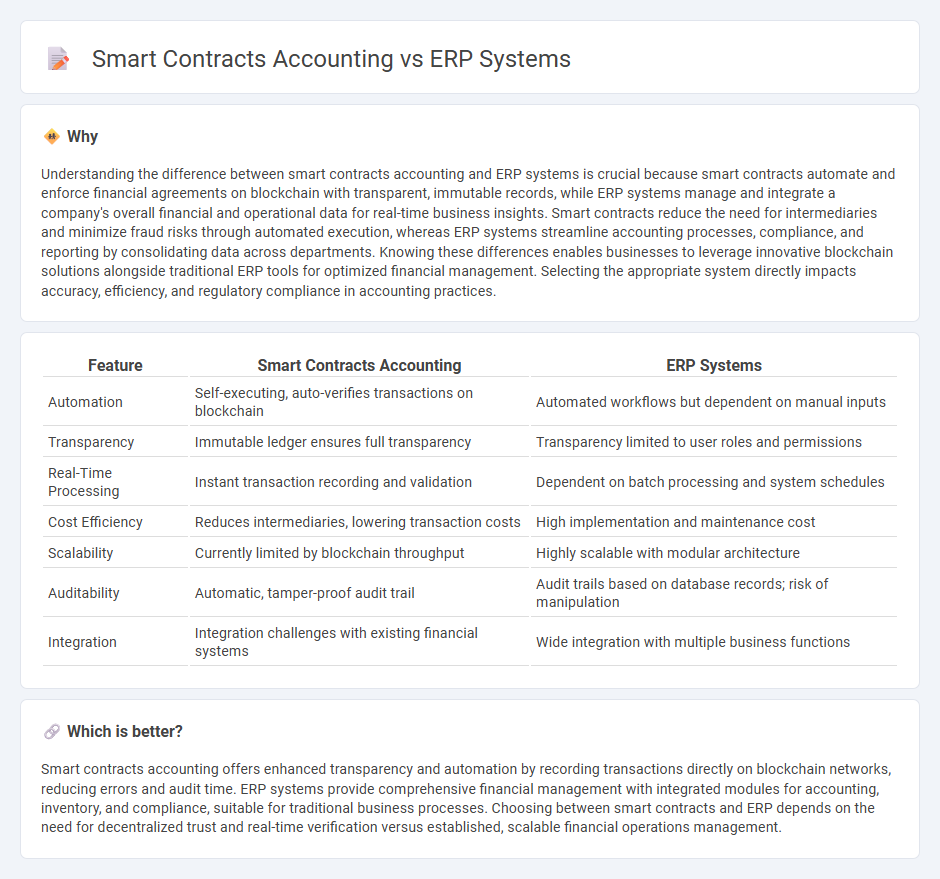
Smart contracts accounting automates financial transactions using blockchain technology, ensuring transparency and real-time verification of contract terms. In contrast, ERP systems manage comprehensive business processes, integrating accounting with inventory, procurement, and human resources for centralized financial oversight. Explore how these innovative approaches can transform your financial management strategies.
Why it is important
Understanding the difference between smart contracts accounting and ERP systems is crucial because smart contracts automate and enforce financial agreements on blockchain with transparent, immutable records, while ERP systems manage and integrate a company's overall financial and operational data for real-time business insights. Smart contracts reduce the need for intermediaries and minimize fraud risks through automated execution, whereas ERP systems streamline accounting processes, compliance, and reporting by consolidating data across departments. Knowing these differences enables businesses to leverage innovative blockchain solutions alongside traditional ERP tools for optimized financial management. Selecting the appropriate system directly impacts accuracy, efficiency, and regulatory compliance in accounting practices.
Comparison Table
| Feature | Smart Contracts Accounting | ERP Systems |
|---|---|---|
| Automation | Self-executing, auto-verifies transactions on blockchain | Automated workflows but dependent on manual inputs |
| Transparency | Immutable ledger ensures full transparency | Transparency limited to user roles and permissions |
| Real-Time Processing | Instant transaction recording and validation | Dependent on batch processing and system schedules |
| Cost Efficiency | Reduces intermediaries, lowering transaction costs | High implementation and maintenance cost |
| Scalability | Currently limited by blockchain throughput | Highly scalable with modular architecture |
| Auditability | Automatic, tamper-proof audit trail | Audit trails based on database records; risk of manipulation |
| Integration | Integration challenges with existing financial systems | Wide integration with multiple business functions |
Which is better?
Smart contracts accounting offers enhanced transparency and automation by recording transactions directly on blockchain networks, reducing errors and audit time. ERP systems provide comprehensive financial management with integrated modules for accounting, inventory, and compliance, suitable for traditional business processes. Choosing between smart contracts and ERP depends on the need for decentralized trust and real-time verification versus established, scalable financial operations management.
Connection
Smart contracts automate financial transactions by embedding predefined accounting rules directly into blockchain protocols, ensuring real-time accuracy and transparency. Integration with ERP systems streamlines data synchronization across ledgers, enhancing audit trails and reducing manual reconciliation errors. This synergy optimizes financial workflows, improves compliance, and accelerates reporting processes within accounting operations.
Key Terms
Automation
ERP systems streamline accounting processes through automated data entry, financial reporting, and compliance management, enhancing operational efficiency for businesses. Smart contracts leverage blockchain technology to automate transaction validation and enforce contract terms without intermediaries, increasing transparency and reducing errors in accounting workflows. Explore how integrating these technologies can revolutionize financial automation and accuracy.
Real-time Data
ERP systems centralize financial data to provide comprehensive real-time accounting insights across various business functions, enhancing operational efficiency and decision-making. Smart contracts automate transaction verification and recording on blockchain networks, ensuring real-time data immutability and accuracy without intermediaries. Explore how integrating ERP systems with smart contract technology can revolutionize real-time accounting transparency and control.
Auditability
ERP systems provide comprehensive audit trails by systematically recording all financial transactions and adjustments, ensuring regulatory compliance and internal control. Smart contracts offer immutable, transparent, and real-time execution of accounting rules on blockchain networks, greatly enhancing the verifiability and tamper-proof nature of audits. Explore how integrating ERP systems with smart contracts transforms audit processes and elevates financial transparency.
Source and External Links
Enterprise resource planning - Wikipedia - ERP systems are integrated software suites used to manage and track core business processes like cash, materials, production capacity, orders, and payroll, often in real time and across departments, and can be cloud or local based.
What is ERP? A Comprehensive Guide - NetSuite - ERP software automates and centralizes data from departments including accounting, manufacturing, sales, HR, and supply chain to enhance efficiency, visibility, and analytics across an organization.
What Is ERP? - Oracle - ERP systems provide tools and processes to run business functions such as HR, finance, manufacturing, and supply chain by ensuring clean, organized data and integrated workflows to improve decision-making and cost tracking.
 dowidth.com
dowidth.com